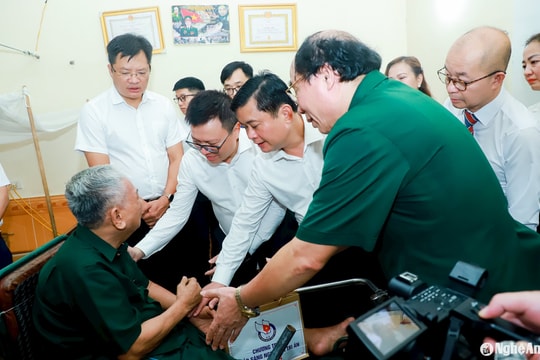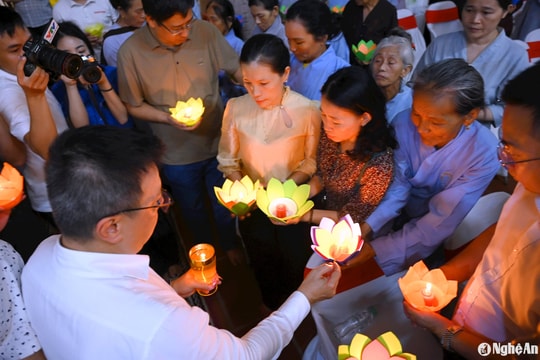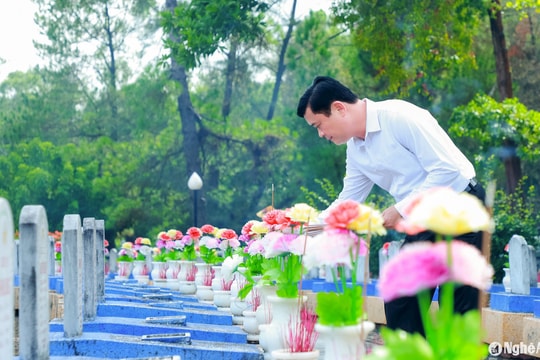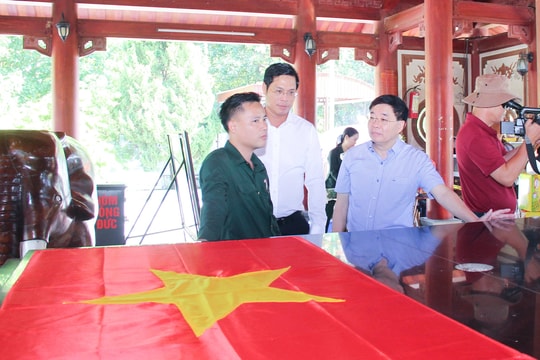Remembering martyr Duong Thanh Hoang - a loyal son of Lang Quynh
On the day you fell, I was marching to the front on the Truong Son road. My friend, this article by my comrade from Lang Quynh would be a substitute for a stick of incense to commemorate you - martyr Duong Thanh Hoang.
Since the day Hoang's grandfather (called Mr. Hung, the eldest son's name, regardless of boy or girl - That is the progressive difference of Quynh village, Quynh Luu district, Nghe An, the homeland of World Cultural Celebrity Ho Xuan Huong) moved to live on Dinh Xom Ao land, a few dozen meters away from my house, the two of us became close friends. In primary school, Hoang followed his uncle (when his father was still teaching) to Nam Thanh, Nam Dan. So I only met Hoang in the summer months. In secondary school and high school, Hoang moved to study in Quynh Doi. Hoang is 1 year older than me - the year of the Dragon, 1 grade above me.
.jpg)
At that time, the radio system reached every alley. In his first year of secondary school, Hoang transferred to Quynh Doi secondary school, and was an excellent Literature student at the village school. In the summer, the two of them often listened to the children's radio program of the Voice of Vietnam, which was relayed. Especially listening to the announcer read Tran Dang Khoa's poems. Hoang especially remembered Tran Dang Khoa's poems. When writing these lines, I still hear Hoang's expressive voice reading the poem "Grain of Rice from Our Village": "The rice grains of our village/ The years of American bombs/ Poured on the roofs/ The years of guns/ Following people far away/ The years of bullets/ Golden as rice fields/ Bowls of rice in harvest season/ Fragrant traffic... Rice grains from our village/ Sent to the front line/ Sent to far away places...".
Hoang has a talent for writing and poetry. Hoang invited me to use school paper to make books bigger than my hand to practice writing children's poems. Hoang's handwriting is quite beautiful, so I practiced writing with him. Hoang is the eldest of three children who have lived with his grandfather since he was a child. After his grandparents moved to Dinh Xom Ao, the two became closer. Thanks to his talent and diligence in practicing poetry, Hoang wrote dozens of poems during the summer. Later, I learned that Hoang participated in a writing contest about "Young people fighting against the Americans" in the Thieu Nien Tien Phong newspaper. Hoang wrote a poem called "Love the homeland" published in issue 649 on July 3, 1970. The poem has the following passage: "Love the green homeland/ Love so many flowers and leaves/ Love the simple thatched houses/ Love so many uncles and aunts/ Are painting the countryside red/ The summer sun is red/ Sweat is pouring down/ Oh, the rich and powerful homeland/ As joyful as a poem" (Duong Thanh Hoang, 14 years old, Quynh Doi commune, Quynh Luu, Nghe An). The poem "Love for the homeland" by Duong Thanh Hoang has been broadcast several times in the children's program of Voice of Vietnam Radio.
Hoang's parent is Uncle Duong Chan Hung (who started as a teacher, became the former Principal of Nghe Tinh Pedagogical School, Secretary of Nghe Tinh Trade Union, Head of the Party History Research Board, before retiring was Deputy Secretary of the Party Committee of the Provincial Party Civil Affairs Agencies). Hoang often calls his parents "Mother Uncle". Duong Thi Ha, Hoang's fourth sister, who used to be a literature teacher at Hung Binh Secondary School, Vinh City, said: his paternal family was a poor Confucian family, Mr. Hung started teaching at the age of 15, so he wanted his children to call him "Mother Uncle". Hoang's childhood was quite difficult. While studying at Quynh Doi Secondary School, Hoang helped his grandparents and took care of his 3 younger siblings so they could live and study well. Hoang and Huy, the oldest, were the pillars for his elderly grandparents. I also have memories of going with Hoang to collect pine needles for fuel in Quynh Van pine forest, 7-8 kilometers from home (I will tell you about it later).
.jpg)
My childhood years passed quickly. The first few years of high school, I left Quynh village to study with my eldest sister in Thai Binh. In the third semester of grade 9, I transferred to Quynh Luu 1 school, evacuated to Quynh Ngoc commune. That year, Hoang was in grade 10, sometimes the two of us walked together to Quynh Ngoc. During this time, the movement "All for the front line, all to defeat the American invaders" developed widely. Especially for young men, there was a movement to write voluntary applications in blood to join the army.
Duong Thanh Hoang was also a member of this movement. At that time, he was in his final year of high school, but Hoang was thin and smaller than his peers. One time, when I went to fetch water from Ao well with him, Hoang said he had written an application in blood to join the army, which was accepted by the commune. I promised Hoang that we would meet on the battlefield the following year. Hoang held my hand tightly like a comrade. The day he went for a health check to gain enough weight, Hoang had to hide some stones in his pocket. So, near the high school graduation exam, on April 26, 1970, Hoang received the decision to join the army and was granted special graduation. I joined the army a year after Hoang in the fall of August the following year... The year "71 came solemnly like a soldier/ When ordered, go in a ready position" (To Huu)...
Writing up to here, I remember so much the places, alleys of the village, the places Hoang and I often passed by and participated in games as children. I think, it is from the simple love of the homeland that our youth multiplied the strength and love for the Fatherland. Duong Thanh Hoang fell in the fight against the Americans in the Southwest. To me, Hoang is always worthy of being a loyal son of the village and forever shining in his youth.
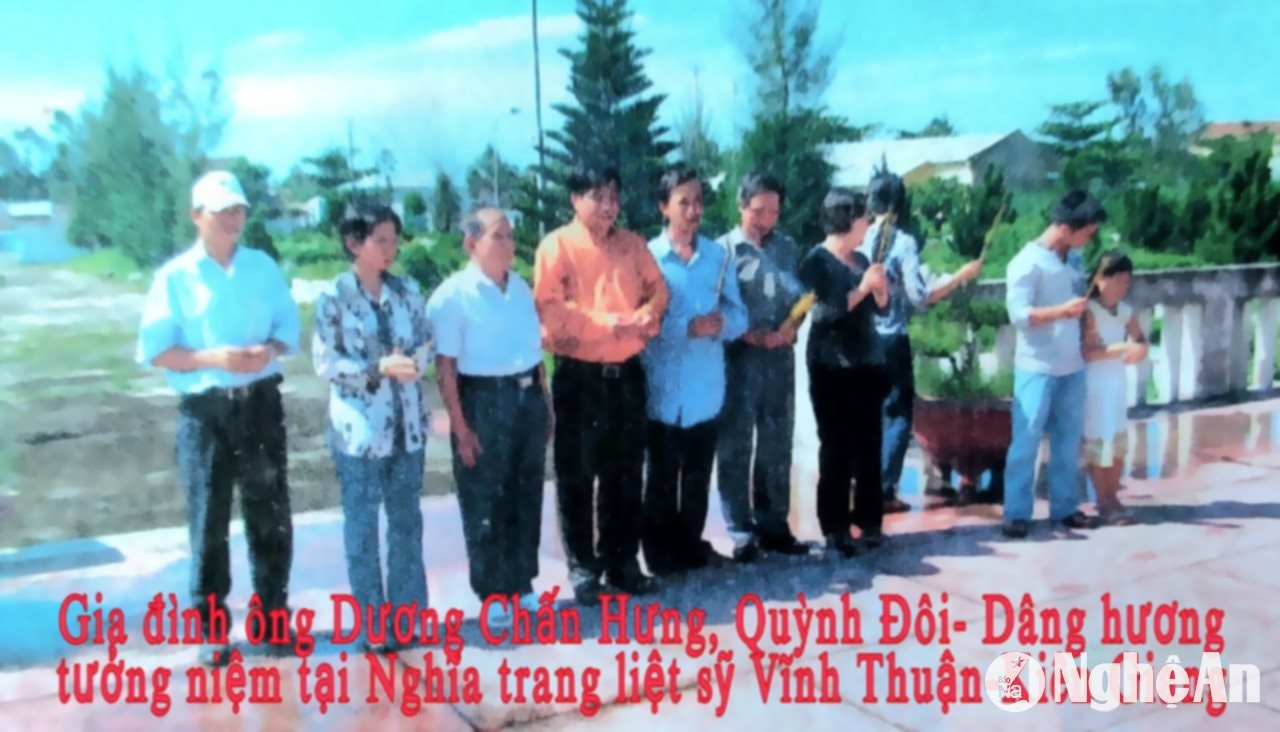
On April 26, 1970, Hoang joined the army. After 6 months of training in Quynh Lam to go to B Long, on November 21, 1970, Hoang was ordered to march to the battlefield. According to the letters Hoang hastily wrote, on November 26, he arrived in Cam Xuyen - Ha Tinh, on November 29, he arrived in Quang Binh, at the end of January 1971, Hoang set foot in the Land of a Million Elephants, 2 months later he arrived in Cambodia. Around March 1971, after more than 5 months of marching along the Truong Son road and passing through 2 friendly countries Laos and Cambodia, Hoang arrived in the Southwest region with mailbox number 796220 Hamlet 2.
In a letter written on the occasion of the New Year on February 1, 1972, Hoang said that he had received a new mission as Propaganda Officer of Group 4, Military Region 9; the main task was to write articles to propagate the unit's movement of killing enemies and making achievements. The letter Hoang sent home to his family was very topical: "From 1969 to 13/1971, the unit destroyed and captured more than 20,000 enemies (including 4,334 American soldiers), shot down 263 planes, burned 452 vehicles of all kinds, and captured many weapons and military equipment. Awarded 7 MedalsQLiberation ArmyThreeand 80HmedalsCall kinds of contributions". Personally, Hoang humbly wrote: "Fought in 5 battles with the unit, was awarded 1 title of Brave Warrior, 3 Certificates of Merit, 3 Certificates of Merit, and was admitted to the Party."
On the occasion of the 77th anniversary of War Invalids and Martyrs Day, July 17, 1947 - July 27, 2024, I remember even more my childhood friend who devoted his youth to the country. He was also a soldier who participated in the 1972 campaign in Quang Tri, served in combat around the Citadel, continued to fight in the Southwest border, Ha Tien, Kien Giang, liberated Cambodia, in the same area where Duong Thanh Hoang fell in the fight against the Americans, and also did propaganda work - wrote for newspapers, when the Engineering Unit of the Capital Military Region was on duty in Vy Xuyen, the northern border, I clearly understood the price of Independence - Freedom, comradeship and belief in victory. Just like Duong Thanh Hoang's belief when he wrote a letter home on February 1, 1972 at Unit Mailbox 796 200, Hamlet 2, Southwest Liberation Army: "But I firmly believe that in the near future, I will return home to reunite with my family when the country is unified."

And the brutality of war is very clear, only 2 months and 17 days after writing that letter, Duong Thanh Hoang heroically sacrificed himself, transforming into the motherland at the end of the beloved Vietnam - Kien Giang land. That was April 18, 1972. On the day Hoang fell, I was marching on Truong Son road through Quang Binh area to quickly add new soldiers to the 308th Pioneer Corps. This article by my comrade Lang Quynh about Hoang is like a stick of incense in memory of my friend - martyr Duong Thanh Hoang...
Phan Van Toan

